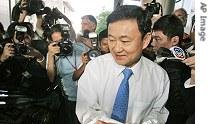April 04, 2006 22:55 PM
By D. Arul Rajoo

BANGKOK, April 4 (Bernama) -- Embattled Prime Minister Thaksin Shinawatra announced Tuesday night that he would step down despite leading his party to victory in a snap election two days ago.
In a 15-minute live television broadcast, the 56-year-old premier said he would remain in his caretaker role until his successor was named.
Thaksin, who came to power in 2001, had an audience earlier with King Bhumibol Adulyadej at the Kraikungwol Palace in Hua Hin.
He arrived at his office at the Government House at 7.30 pm with his wife, Pojaman Shinawatra, and two daughters.
Thaksin said his decision not to retain the premiership in the next government was aimed at restoring peace and unity in the country, which was deeply divided by his strong support in the north and northeast and growing opposition to his leadership in the capital and in the south.
During the telecast, Thaksin apologised to the 16 million people who had voted for him in the April 2 election.
Thaksin said one of the main reasons for his decision to resign was due to the celebration of King Bhumibol's 60th anniversary on the throne in June where royalties from more than 20 countries are expected to attend.
During a talk show Monday night, Thaksin revealed the name of former House Speaker Bokhin Bhalakula and Deputy Prime Minister and Commerce Minister Somkid Jatusripitak as two of the four who would probably replace him if he resigned.
The other two names he apparently had in mind were deputy TRT leader Pokin Polakul and another deputy prime minister, Surakiart Sathirathai, who is Thailand's candidate for the post of United Nations secretary general.
His decision, which looked unlikely until Monday, came despite him having led his Thai Rak Thai party to victory in the election boycotted by main opposition parties. More than 10 million people marked "no vote" as a sign of protest in the election and the People's Alliance for Democracy (PAD), which organised massive rallies in the capital calling for Thaksin's ouster, has vowed to continue demonstrating until he stepped down.
In his 33 years of a high profile career, the Chiang Mai-born politician rose from a policeman to a successful businessmen when he started his own company, the Shinawatra Computer and Communications Group. Its expansion was astronomical and it was sold to Singapore's Temasek Holdings in January in a 73 billion baht (about RM6.95 billion) deal.
It was Shin Corp's tax-free sale that started a mass movement to force his ouster as critics claimed Thaksin sold national assets to a foreign company which could threaten national security.
Earlier Tuesday, Democrat Party leader Abhisit Vejjajiva said the party would join the next election if Thaksin resigned as promised.
During the talk show Monday night, Thaksin said he would resign immediately if the PAD stopped all street demonstration protests and if the former opposition parties promised to contest an election after the political reform.
"I am prepared to resign but they must give me good reasons so that I could explain to the 16 million people who voted for me," said Thaksin, who first came to power in 2001.
The boycott on Sunday saw TRT candidates running alone in 278 constituencies in 71 provinces and to win they had to get at least 20 per cent of the votes cast.
The second round of election for 38 constituencies where candidates failed to get the 20 per cent of votes will be held on April 23 and the Election Commission will allow new candidates to apply.
More than 28 million voters turned up for election on Sunday, or 64 per cent of the eligible 45 million voters, compared to 73 per cent in 2005.
Thaksin dissolved parliament barely a year after winning his second term in office, amidst massive rallies in the capital demanding that he step down over allegations of power abuse and corruption.
Prior to the election, Thaksin had promised to step down if TRT got less than 50 per cent of the votes cast. But unofficial results showed that TRT had won 16 million votes compared to about 12 million garnered by smaller parties, invalid votes and those marked as "no vote".
Thaksin's decision to give in to the protestors strengthened a long-held believe in the capital that "the north selects the prime ministers while Bangkok brings them down".
Thaksin's career in government started in 1994 when he became a foreign minister and a year later led the Palang Dharma Party. Subsequently, he became a deputy prime minister in 1995 and established the TRT in 1998.
During his tenure, economic growth had risen significantly and he was seen as having delivered on his past promises to give cheaper health care, soft loans and various other benefits aimed at his supporters in rural areas, particularly in the TRT stronghold of the north and northeast.
However, his premiership was marred by insurgency in the Muslim-majority southern provinces. More than 1,000 people have died since violence erupted two years ago, and he was slammed for the death of many Muslims during two incidents in the south.
Among Asean leaders, Thaksin is considered the most senior figure after former Malaysian Prime Minister Tun Dr Mahathir Mohamad stepped down in 2003.
Bernama.com
Malaysian National News Agency
No comments:
Post a Comment